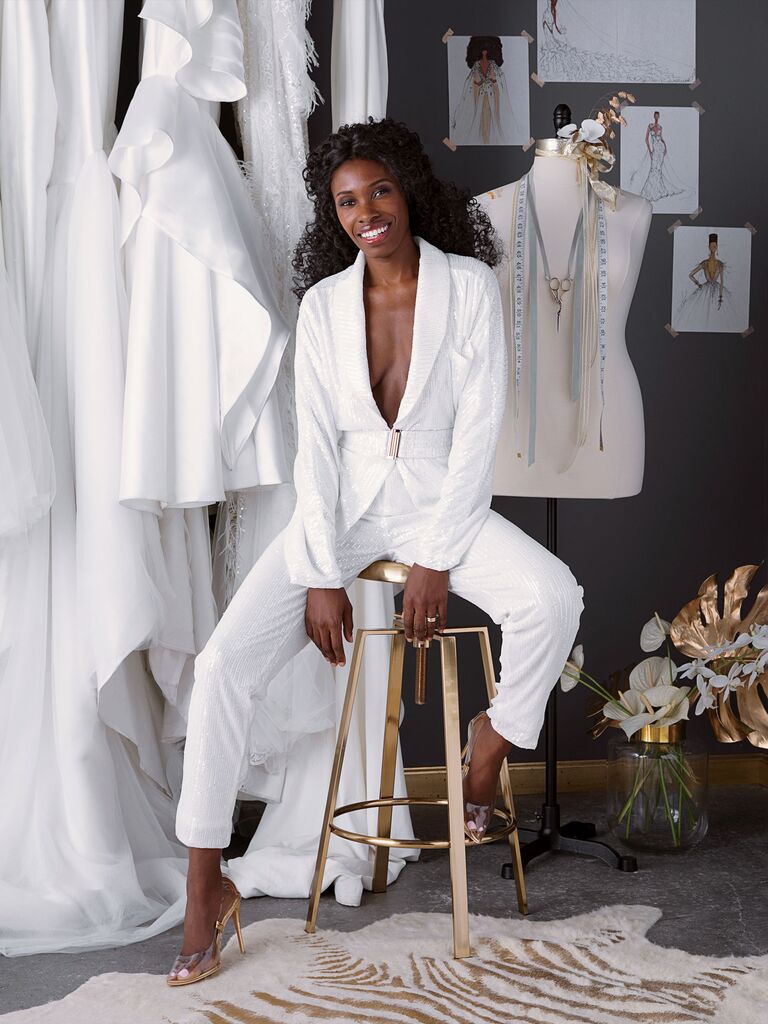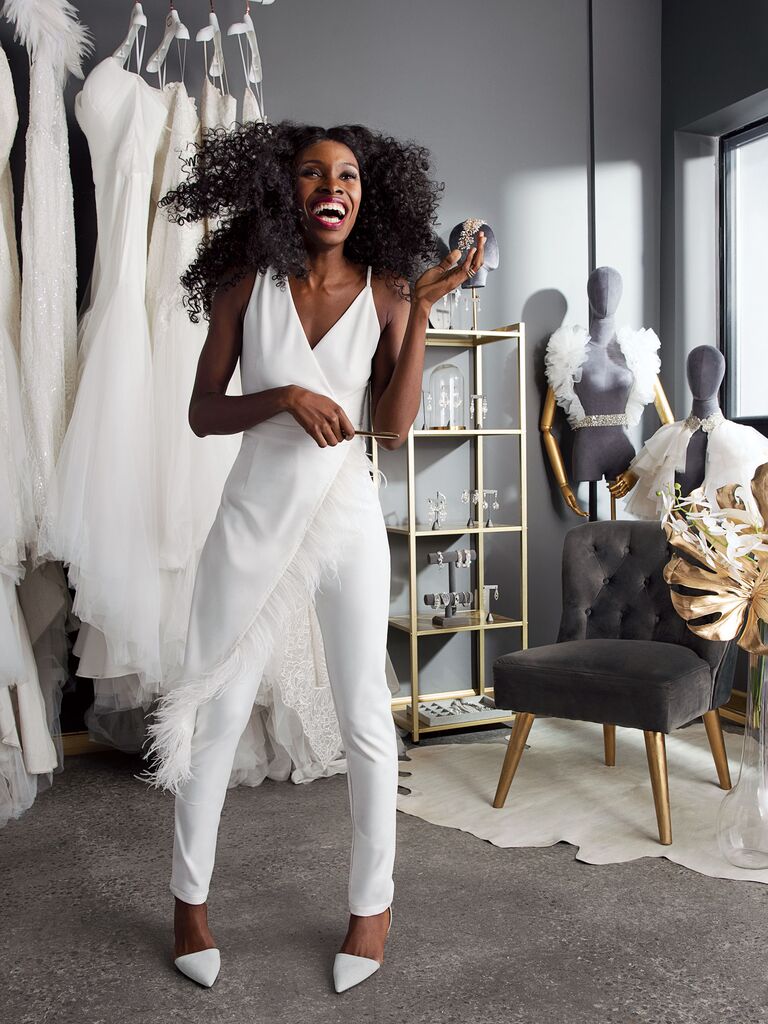Andrea Pitter of Pantora Bridal On How the Wedding Industry Can Do Better
Andrea Pitter noticed a glaring lack of wedding gowns and stores created with Black women in mind—so she created her own, Pantora Bridal. Here, the New York designer, salon owner and winner of Season 2 of Amazon Prime's 'Making the Cut,' shares her journey from one custom dress to a bridal empire with The Knot's Senior Fashion and Beauty Editor Shelley Brown for The Knot magazine.
I first connected with Andrea Pitter, when I was writing a Black Wedding Dress Designers to Follow Now article (we'll get into that later). Two things about Andrea struck me immediately: First, she described Pantora Bridal, in Brooklyn, NY, as a "safe space for Black women," detailing how a few dresses and a tiny showroom became a fully fledged boutique and wedding dress collection that is now carried at the iconic Kleinfeld. Second, she was brutally honest about the lack of inclusivity in the wedding industry, highlighting the media's role in underrepresenting or misrepresenting Black couples in particular. "What we're doing is bigger than dresses," she said more than once, and she was absolutely right. I knew I wanted to know more about Andrea's story, and that her perspective deserved more than a few sentences in a list. What resulted was a raw and real conversation about the numerous challenges women of color face when shopping for wedding attire, the greater cultural implications of how Black love is portrayed and what gives her hope for the future.
Shelley Brown: Congratulations on your big win! How does it feel?
Andrea Pitter: Everything is sinking in. I'm full of emotions. I could burst! In fact I've been bursting.
SB: Why is this a significant moment for you?
AP: First and foremost representation is everything. Women like me belong in all spaces. I've worked really hard, I built Pantora from nothing just hard work and big dreams. I'm happy to have full circle moment. I'm being rewarded for my life's work.
SB: What do you hope this win does for the wedding fashion industry?
AP: I hope my win puts the wedding industry on notice, solidifying that Pantora is here not just to stay but also to create waves within the industry. My win puts a focus on different talent, with a different perspective than what we've seen traditionally.
SB: What's the most valuable lesson you learned from this experience?
AP: Keep your foot on the gas. Comparison is the thief of joy. Your personal journey is just if not more important than your professional one. Confidence is key.
SB: What's your advice to young designers?
AP: Find out why you want to design or who you're serving. Commit to your "why"! You'll be able measure success from another perspective outside the usual performance metrics.
SB: What inspired you to both design dresses and open a bridal salon? That's a rare combination in the wedding industry.
AP: It is rare. I started Pantora Bridal when I was around 20 years old. I wanted my dresses to be in stores but I realized I was a little green and the stores weren't necessarily taking me seriously. I knew that in order to sell wedding dresses, I had to be my own seller. So I opened the store in 2013. And we continued to go to New York bridal market and attempt to pick up retailers, but it wasn't that easy. A lot of retailers were playing the comparison game like, 'Oh, you're the Black Vera Wang.' And I was like, 'I'm just Andrea. We don't have to turn me into someone else so it's more palatable for you.' Eventually I stopped going to bridal market altogether because it wasn't a positive experience for me or for my business. We decided that we would keep the store going, and we would pump the brakes on finding retailers that would pick up our brand. We decided that the retailers who would work for us would seek us out.
SB: Pantora Bridal started as a small showroom and is now a fully realized brand. What was that journey like?
AP: It was really hard. I've quit many times and come back the next day (laughs). When we opened the store in 2013, it was really just myself and maybe one other person and brides were coming in one at a time, based on referrals. And then it was one bride told 10 brides and all of a sudden we were this full-fledged bridal brand and bridal salon. We had to keep adjusting to the demand. So it started off as a 400-square-foot boutique and we opened up an extension store across the street, because it was the closest thing that had more space. Then we realized that it was not ideal for us to be bouncing back and forth from one space to the next. Then our first retailer picked us up, and we realized we were expanding fairly fast. So about three years ago, we moved to Nostrand Avenue, which is about a 3,000-square-foot space. Our team has tripled in size, and we're now sold at four retailers and were recently picked up by Kleinfeld. I'm really excited about that. They're pros and have been really, really supportive.
SB: You mentioned you've quit many times and come back the next day. What are some of the challenges you faced?
AP: One time at bridal market, a retailer wanted to pick up our dresses, and they didn't know that I was the designer. They thought I was a sales girl. I didn't fully introduce myself, and we were having this great conversation and they're telling us what dresses they want to pick up, and we're writing out the order and they're saying they're going to buy a plane ticket and they just need to understand the designer's schedule, so that they can prepare for a trunk show. And I realized in that moment that they didn't know I was the designer. The minute I said so, their demeanor changed and they said, 'Oh, we'll follow up.' I didn't want to be negative about it, but when I called them back the gatekeepers were real. They were like, 'We don't know what you're talking about. We never had a conversation.' It was a complete 180. And it felt like that was the way it was going to be at bridal market.
And then when Pantora does get recognition, it's often on a 'Black Designers' list. I think a lot of Black designers experience that. Our talent exists year-round, but when we get recognition it's only on 'Black Designers to Know' lists. But if we are talented, and you truly want to give us the recognition, then it should come at any point in time, not just when you want to specifically acknowledge Black talent. And that's been one of the hardest things, because I think I'm talented overall, not just a talented Black person.
SB: That's so true. It's a multilayered issue and I think a lot of brands and editors are guilty of it—myself included. There's a lot of talent not listed on the CFDA (Council of Fashion Designers of America) calendar during bridal market, and we all have to do better at recognizing that.
AP: There really is. It's amazing to see the media putting a focus on Black talent. It is multilayered, just like you said. And it goes back to resources. I was a part of a forum recently where I talked to up-and-coming Black designers about how to get their businesses ready. And what happens is so many stores want to pick up Black designers, and they may pick up two or three brands, but the brands can't sustain it because they don't fully understand the process of what it's like to have a bridal brand. So the designs are amazing, but the business side of things is not so amazing. Or they don't understand supply and demand. Or they don't understand what it's like to order dresses seven months in advance. They don't understand consistency. There are so many expensive lessons to learn. I went to bridal market twice and that alone is a five-figure experience. So it's an experience where you're spending so much money and probably just trying to learn because no one is placing orders. I don't know many designers who can sustain that.
SB: You make such a good point about resources. It does cost thousands of dollars to be a part of bridal market. I don't think most people know or even consider that.
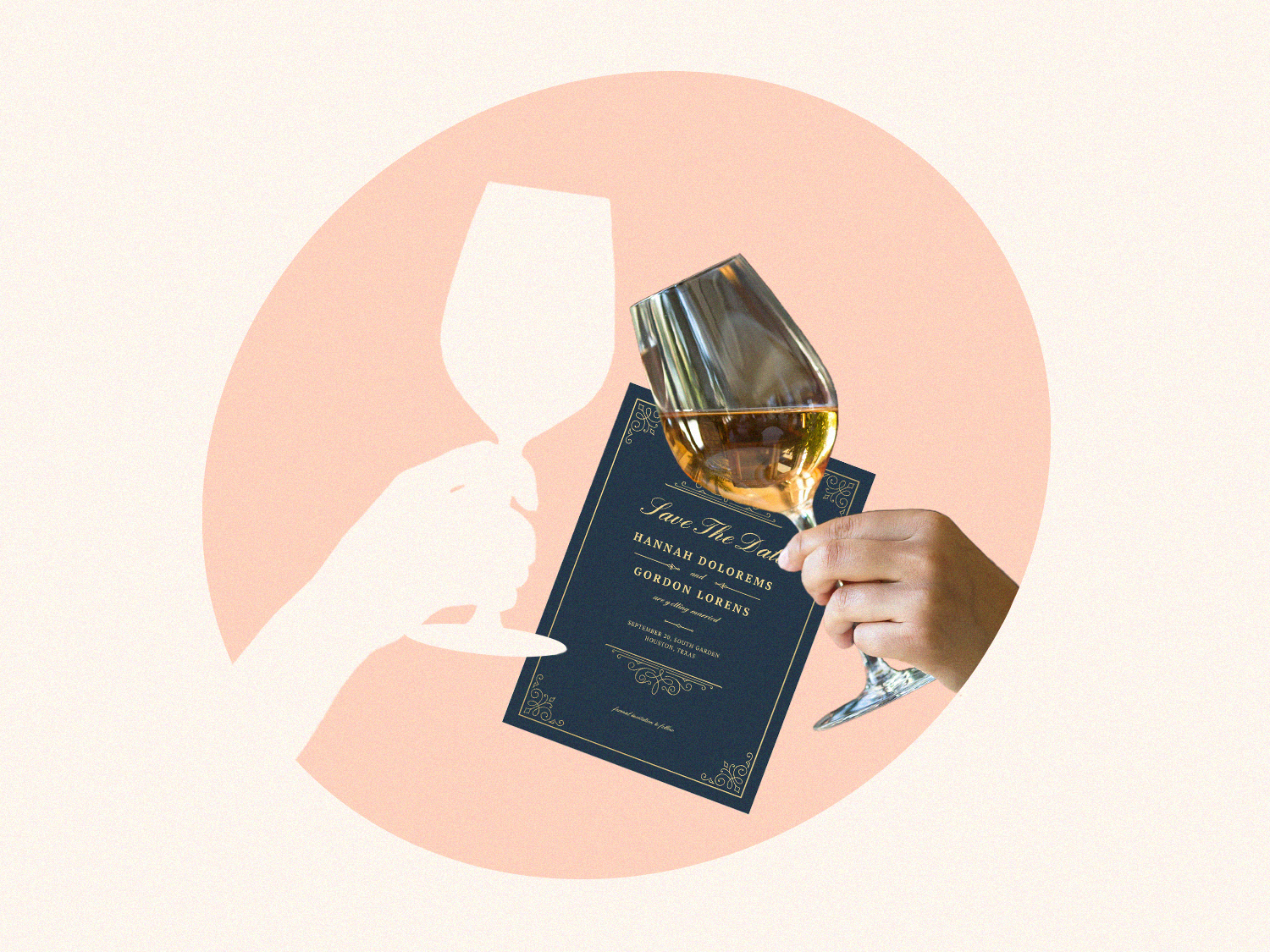
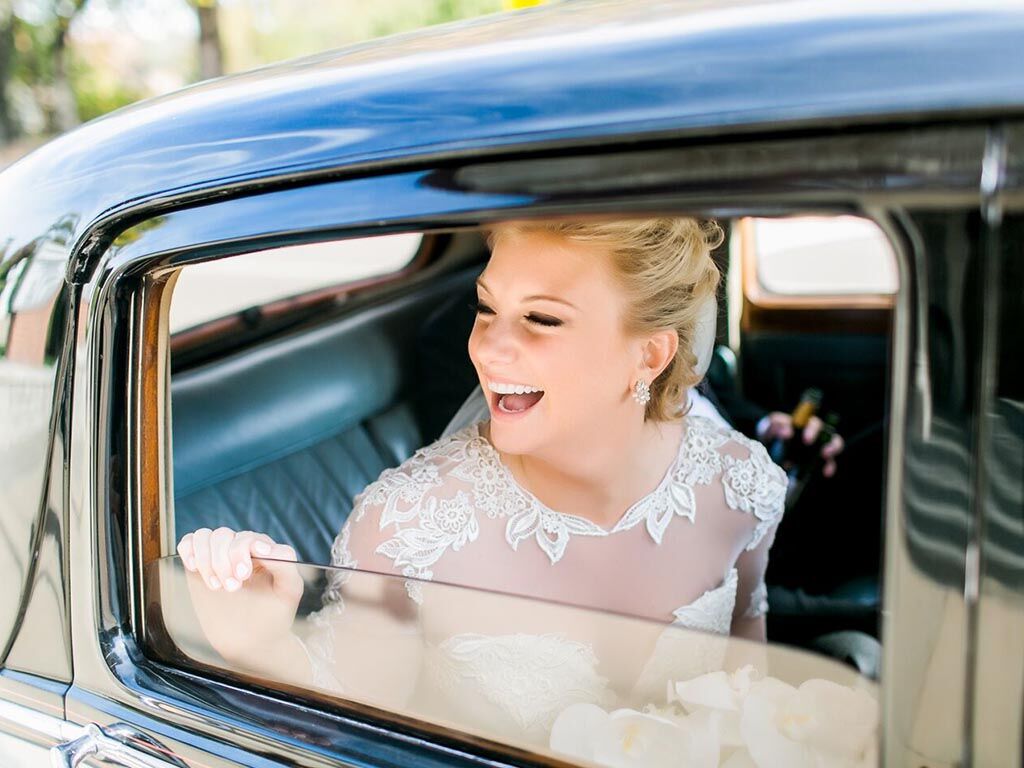
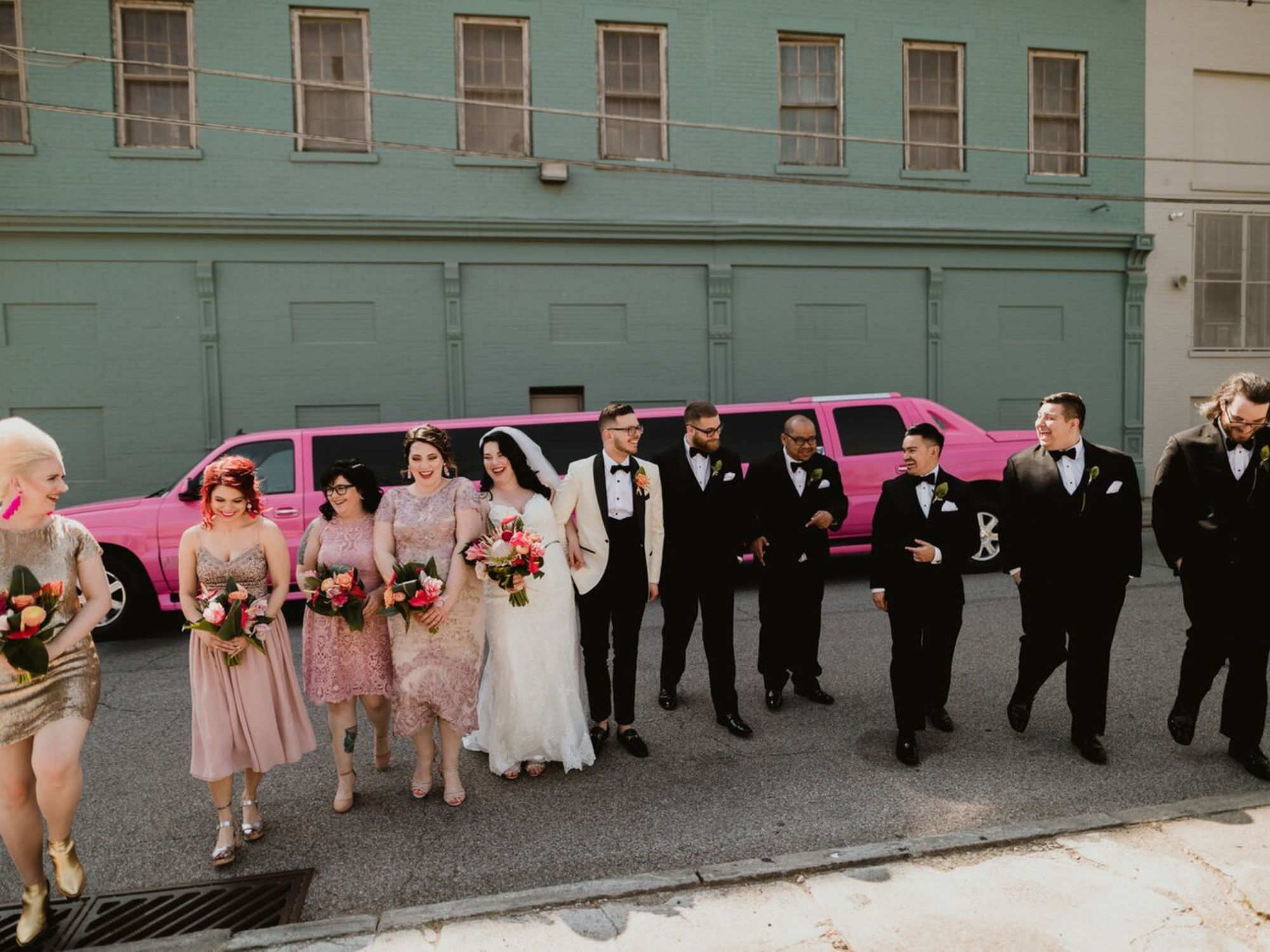
AP: Yeah and it's not just to attend bridal market, but to be prepared and to even be competitive amongst the people who are building amazing booths, bringing in the best models and paying for the best images. It's such a big expense. You go once, and you think you've learned a lot, and then you go a second time, and you realize that you've learned a lot, but you're also up against a lot of bias.
SB: You've been very outspoken about the lack of inclusivity in the wedding industry. How would you like to see it change?
AP: I think that Black women have such big spending power. The fact that we aren't acknowledging them in fashion does not make any sense. It just doesn't. I would love for size charts to make sense for different body types. I would love to see designers and brands pay attention to skin tones. Pantora is not the first brand to create mesh that matches skin tones—and we would never claim to be— but we made a point of creating a line of mesh called Forgotten Skin Tones that addresses as many skin tones as possible, so Black women can get the illusion look that's trending everywhere. I would love to see other brands do that.
I'd love for people to really understand what diversity looks like, because it's not just including Black women. It's also their thoughts, sentiments and culture. I think sometimes we think that diversity is legitimately just putting a Black face in the room. But what are the thoughts of that Black person? How does that represent the community? And I don't think any one Black person can represent everyone. I actually understand why everyone may not be as opinionated as I am, because when you speak so loudly about concerns and issues like this, it's very hard to make sure that people understand that you're not trying to be the Black delegate. I can just speak for people who are like me and who think like me, but I can't speak for every Black person. I can defend us and speak up as much as I can, but I can't speak for everyone.
But I do think that even the way Black women appear in the media is an issue. In bridal photo shoots, when we are included we are often the bridesmaid. We're rarely the bride. Or sometimes it feels like we're a prop. If we were thought of differently, it could change the way the media portrays us. And that goes back to having Black women in boardrooms. It's not just about hiring a Black person. Black people should also be actively making decisions. We're going to get so much further as a society just by realizing what inclusivity means.
SB: Can you talk more about the challenges you mentioned that many women of color specifically face when shopping for wedding attire?
AP: I think oftentimes salespeople don't understand how close- knit and family-oriented we are. It's not just the bride being celebrated, it's also perhaps the mom or the sister or, you know, another person who's been supportive. Black people are so celebratory—as we should be. We've been through a lot and we've survived so much. I don't think that everyone always understands why we celebrate so hard.
Beyond that, at Pantora we have questionnaires we give our brides when they come in and we try to understand what it is that they want to get out of their appointments. I've had too many brides come into our salon and say they've been told they're considered plus-size, and we're looking at them like, 'There's no way.' And it's because they have a booty. Then the dresses that they're being told are the best dresses for them are all A-line or the alterations suggested don't give that little pinch that shows off the booty. We want to show the curves! And it can feel like these ideas are somewhat frowned upon, or people are not necessarily taking the time to understand our body types or our values.
It's also not always about the selection of dresses available. It's also about what's being suggested, and salespeople not being trained that there are lots of women with curves who want to show them off and appreciate them. But the media tells us that if you're curvy you should hide your body—and even 'curvy' is a hard word because that means you have a small waist and a big bust and big hips— but we're talking about real women who may not look like a video vixen or a model. But they are women who love their bodies and are not trying to hide them. And it's just bizarre to me that fashion is so personal, and so many people in the industry don't understand that sometimes brides are going for the feeling first and not necessarily what it looks like first. And the thing is, what might be ideal to me might not be ideal to you. I think it's really important that the person actually wearing the dress feels good about themselves and feels like who they are is being represented.
SB: Why is representation in bridal fashion so important?
AP: We're very willing to accept money from Black women, but we're not willing to accept the thoughts of Black women. Representation is important because I need to be able to see myself when I'm shopping, and I need to know that my voice is heard. I need to know that my money is going to a place that represents my values. Black women do, in fact, get married, despite what the media tells you. Black love is very prevalent, despite what the media tells you. So we need to show as much Black love, Black body acceptance and Black joy as possible.
SB: So you're saying there's a connection between how Black people are stereotyped and how they're underrepresented in the wedding industry?
AP: Yes. A lot of people think that Black families are not whole, and it's not true. It's just not true. So when we don't show Black love and Black families, it ties back to that stereotype that we've been trying to break for centuries.
SB: How can the industry as a whole keep the momentum of this conversation and this movement going?
AP: The first order of business is to go hire some Black people and not in a performative way. I've noticed over the past couple of months that a lot of brands have booked more Black models—but what does your core team look like? Because if it does not include Black women, all you're doing is putting a face out there, but you're not representing the values. Maybe a lot of foolishness would stop if we had different opinions being heard. Historically, the wedding industry and the fashion industry are white, male-owned and -operated, but geared towards women. I just think that it's time to listen to the people who are dropping the coin. And I'm so happy that people are waking up and Black women are demanding better.
Even with this The Knot feature, I'm excited that I've been extended a seat at the table. I think it is time for larger publications that are historically white to acknowledge other talent. You said I've been very vocal about representation, and I have been. I understand why some Black businesses 'whitewash' their businesses or step to the side, because they've been told it will make them more successful—I'm not even mad about it, because a lot of people told me to do that too. It's just not an option for me. Black women built my business, and I am not going to be quiet about it. I'm going to sing their praises because Pantora wouldn't exist without them and their continued support. I'm emotional about this. It's emotional for me because my business is about good intentions. We are rooted in good intentions—we are representing the underrepresented.
SB: What's next for you?
AP: I'm working on opening the Pantora Downtown Los Angeles store as well as Pantora Bridal Los Angeles.
PHOTOGRAPHER Andre L. Perry
FASHION STYLING Shelley Brown
WARDROBE + PROP STYLING Kerry Reardon at RayBrownPro.com
HAIR + MAKEUP Gregg Hubbard for MAC AND KÉRASTASE
--
To get even more insight into essential wedding and planning advice, inspiration from real couples and more, pick up a copy of The Knot Spring 2021 issue at your local Barnes & Noble or head over to Issuu and virtually flip through. You can also purchase issues online at The Knot Shop and have it delivered right to your door.


